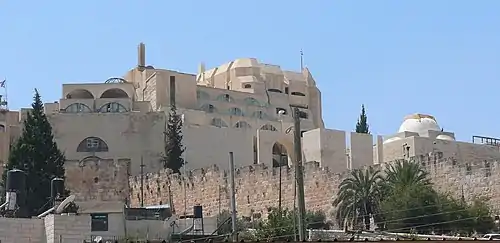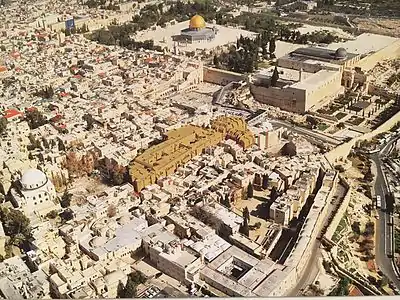Yeshivat HaKotel
Yeshivat HaKotel (Hebrew: ישיבת הכותל, lit. 'Yeshiva of the Western Wall') is a religious Zionist Hesder yeshiva situated in the Old City of Jerusalem. The yeshiva's building is located opposite the Temple Mount and overlooks the Kotel (Western Wall), hence its name. Most of the students are in the Israeli Hesder program which combines at least fifteen months of army service with several years of Yeshiva study.[1]

Rabbi Baruch Wieder, the former Rosh Kollel, serves as the Rosh Yeshiva. The previous Rosh Yeshiva was Rabbi Yeshayahu Hadari zt"l who served as Rosh Yeshiva for more than thirty years, although not consecutively.
Yeshivat HaKotel has a program for English-speaking students. The Dean of the program for overseas students is Rabbi Reuven Taragin. The program offers integration with Israelis, a broad comprehensive curriculum in Talmud, Tanakh, Machshava, Halacha, and Mussar, and personal long-term relationships with Rabbis and other staff.
In 2006, Yeshivat HaKotel opened a new program intended for Portuguese and Spanish-speaking students, headed by Brazilian-born Rabbi Daniel Segal. As of 2011, more than 100 students from Latin American countries, like Brazil, Argentina, Uruguay, Mexico, Panama, Peru and Colombia, and also from Portugal and Spain, have graduated this special program.[2]
History
The Yeshiva was founded shortly after the Six-Day War in 1967 in the old city of Jerusalem by Harav Aryeh Bina, who at that time was a Rav in Yeshivat Netiv Meir. Due to the instability of the political situation of the old city at the time, Rav Bina wanted to cement a Jewish presence in the old city by starting a yeshiva there. The first Shavuot after the war, which took place approximately one week after the recapturing of the old city, Rav Bina started bringing groups of Talmidim to learn in abandoned Jordanian barracks near the connection of the Western and Southern walls of the city. Not long after, under the guidance of Rav Bina, Rav Moshe Tzvi Neria, Rav Zuckerman, and a few others the Yeshiva relocated to a long abandoned homeless shelter in the "old square." Harav Yeshayahu Hadari, a former student of Chevron Yeshiva and the Mashgiach at Kerem B'Yavneh at the time, was chosen to be the Rosh Yeshiva and ended up serving for over thirty years. He brought in the Yeshiva's first two non-founder Magidei Shiur (rabbeim who gave shiur in mornings) who were contemporaries of his from Yeshivat Ponovitch. Rabbi Avigdor Nebenzahl, former rabbi of the old city, was another of the Yeshiva's early Ramim after learning for several years in Yeshivat Hakotel's kollel. Rabbi Yeshayahu Hadari elevated him to Ram status after it was repeatedly pointed out just how expansive the breadth of his Torah knowledge was.

In the early 1980s the Yeshiva moved to its permanent location where it is currently stationed. During the first digging and foundation laying of this new building in the late 1960s led by architect Eliezer Frankel, an important archaeological site was discovered now known as the Herodian Quarter. This significantly delayed the building's construction for the archaeological excavations to be completed leading to the building not being dedicated until the middle of the 1980s. This new Hakotel building spans a land area of 3,125 meters making it the largest building in the Jewish Quarter. Its height of 32 meters above the plaza of the Western Wall, in addition to the large Israeli flag waving on top of the roof, make it the highest point in the Old City. The dormitories are designed to house 350 students with an additional 14 apartments for families and guests. The recently renovated Beit Midrash can fit almost 500 students at any given time.
Notable alumni
- Menachem Froman z"l, founding member of Gush Emunim and former chief rabbi of Tekoa
- Rabbi Haim Sabato, cofounder of Yeshivat Birkat Moshe (Ma'aleh Adumim)
- Rabbi Yitzchak Sheilat, cofounder of Yeshivat Birkat Moshe (Ma'aleh Adumim)
- Rabbi Yitzhak Levy, Knesset member
- Rabbi Rabbi Benny Kalmanzon, of Yeshivat Otniel
- Rabbi Rabbi Shmuel Tal, Rosh Yeshivat Torat Chaim
- Rabbi Rafi Peretz, Chief military Rabbi
- Rav Michael Amos, Dayan on Beit Din Hagadol
- Rav Adam Shasha, Chief Rabbi of 72 Singleton Road
- Yair Dreyfus, Rosh Yeshivat Hesder Siach Yitzchak
- Meir Tviyar, Rosh Yeshivat Netiv Meir
Roshei Yeshiva
- Rav Yeshayahu Hadari, 1967–1998
- Rav Shagar (Shimon Gershon Rosenberg), 1982 (filled in during a Rav Hadari sabbatical)
- Rav Chaim Katz, 1998–2002
- Rav Mordechai Elon, 2002–2006
- Rav Yeshayahu Hadari, 2006–2008
- Rav Baruch Wieder, 2008–present
References
External links
- Official site (in Hebrew)